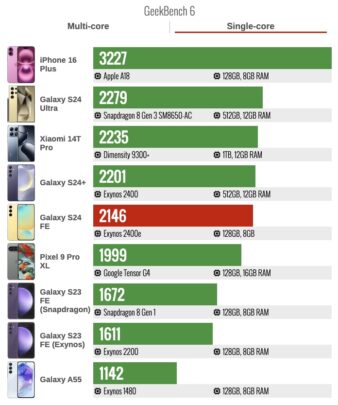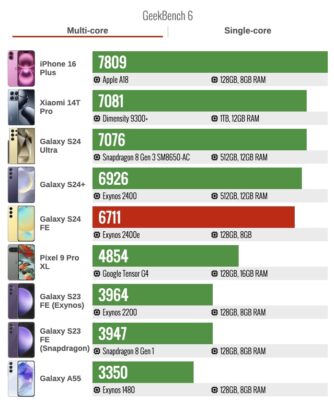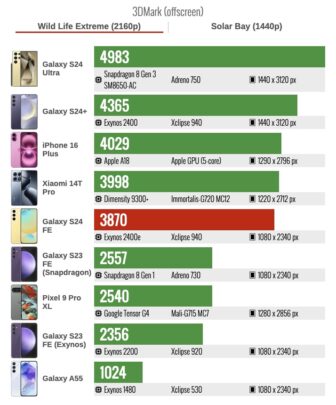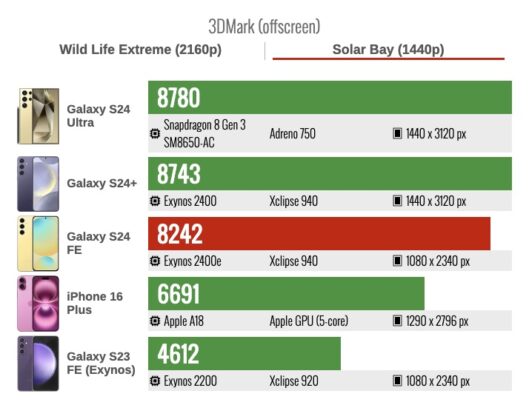Samsung used the Exynos 2400e in the Galaxy S24 FE to lower manufacturing costs. The new in-house chip is a slightly downclocked version of the Exynos 2400 used in the Galaxy S24 and the Galaxy S24+, but how does it affect the phone’s performance? It has been found that Samsung hasn’t cut many corners. A test found that the Exynos 2400e beats the iPhone 16 Plus’ A18 chip in ray tracing performance.
Exynos 2400e beats iPhone 16’s A18 chip in ray tracing, isn’t a significant downgrade from Exynos 2400
The Exynos 24ooe’s performance was tested by GSMArena, and it has been revealed that it isn’t a significant downgrade compared to the Exynos 2400 used in the Galaxy S24 and the Galaxy S24+.
In Geekbench 6’s single-core CPU test, the Exynos 2400e scored 2,146 points, while the Galaxy S24+’s Exynos 2400 scored 2,201 points. In the multi-core CPU benchmark, the Exynos 2400e scored 6,711 points, while the Exynos 2400 reached a score of 6,926 points. So, the Exynos 2400e was just 2.5% slower in the single-core test and 3.2% slower in the multi-core test.
In terms of graphics processing, the Exynos 2400e scored 3,870 points in 3DMark’s Wild Life Extreme GPU test at 4K resolution. In comparison, the Galaxy S24+’s Exynos 2400 chip scored 4,365 points, while the Apple iPhone 16 Plus’ A18 chip scored 4,029 points. That makes the Exynos 2400e 12% slower than the Exynos 2400 and 4% slower than the Apple A18.
In 3DMark’s Solar Bay test, which tests a device’s ray tracing performance, the Exynos 2400e scored 8,242 points. The Exynos 2400 scored 8,743 points, while Apple’s A18 scored 6,691 points. That makes the Exynos 2400e around 6% slower than the Exynos 2400 and 23% faster than the Apple A18.
Despite being $150 cheaper than the iPhone 16 Plus, the Galaxy S24e has performed admirably. It is just 4% slower in general GPU benchmarks and over 23% faster in ray tracing. Compared to the Galaxy S24+’s Exynos 2400 chip, the Galaxy S24 FE appears to be less than 5% slower in CPU tests, 12% slower in GPU rasterization tests, and 6% slower in GPU ray tracing tests.
We think most people will not notice any difference in performance between the Galaxy S24 FE and the Galaxy S24/S24+ in day-to-day tasks or gaming. And that is great when someone is spending $350 less and choosing the Galaxy S24 FE over the Galaxy S24+.






![iOS 18.0.1 coming soon with iPhone and iPad bug fixes [Update]](https://trend.slink.ph/wp-content/uploads/sites/11/2024/10/iOS-18.0.1-336x220.jpg)

